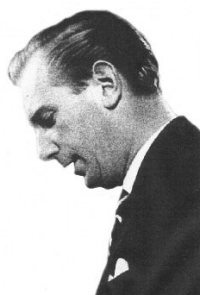Duncan Wood was born in 1925 in Bristol and joined BBC Radio Bristol as a trainee sound engineer in 1941, returning there as an engineer in 1948 following war service. In the early 1950s, he became a radio variety producer, then in 1953 he moved to television. Dennis Main Wilson had produced the first four series of the hugely popular 'Hancock's Half Hour' on BBC radio from 1954 to 1957. Duncan's television adaptation of 'Hancock's Half Hour' (BBC, 1956-60), followed by 'Hancock' (BBC, 1961), repeated that success. Up until 1970, Duncan Wood was also responsible for developing and producing 'Steptoe and Son' (BBC, 1962-74). He also produced the first and most of the second series of 'Citizen James' (BBC, 1960-62), created by Galton and Simpson for Sidney James following his departure from 'Hancock's Half Hour'; and 'Frankie Howerd' (BBC, 1964-66), in which Galton and Simpson helped to re-establish Howerd as one of the country's finest comedians in a mix of stand-up and comic sketches. Duncan's other 1960s productions include 'Benny Hill' (BBC, 1962-63), the television recording of the famous stage revue 'Beyond the Fringe' (BBC 12/12/1964); and two series of 'Harry Worth' (BBC, 1966-70). He was also responsible for the first two BBC television presentations of the 'Royal Variety Performance'. In 1970, Wood became Head of Comedy at the BBC. Comedy series beginning during his period of office include 'The Two Ronnies' (1971-86), 'Last of the Summer Wine' (1971-2010) and 'Some Mothers do 'Ave 'Em' (1973-78). In 1973 he left the BBC after 25 years to accept a position at Yorkshire Television as Controller of Light Entertainment, where he was involved in the production of 'Rising Damp' (ITV, 1974-78). Duncan was also responsible for the very popular game show '3-2-1' (ITV, 1978-88); the betting-themed game show, 'Winner Takes All' (ITV, 1975-88); and a number of variety shows starring Harry Secombe. Duncan retired in 1984, although he remained a consultant at Yorkshire for a further two years. He died on 11 January 1997, only a few days before the death of his old contemporary, Dennis Main Wilson. |
